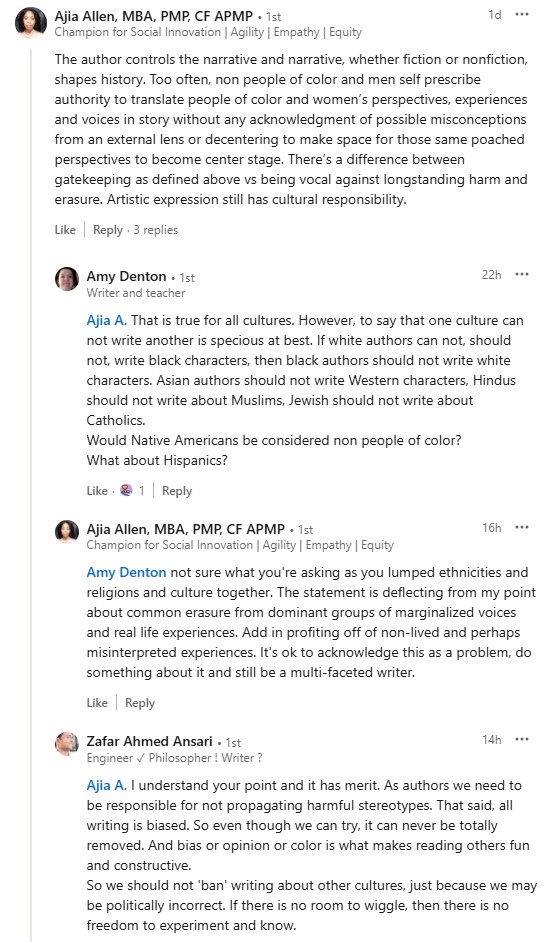“Gatekeeping” is typically a claim made by authors who resent being urged to hire professional editors, designers, and graphic artists to produce quality books. They view the reading public’s expectation of and demand for quality as prohibitive and unreasonable because they publish their books for themselves and want to acquire fame and fortune from those books.
I understand it. I used to be one of them.
However, there’s another kind of gatekeeping, and an entire branch of service has formed around it: sensivity reading.
Sensitivity reading stems from the conviction that authors are not able to and should not write characters if they don’t have the lived experience of those communities from which those characters are derived. To do so assumes adherence to pejorative stereotypes and incites outcries of cultural appropriation. The offended typically apply this to white authors writing Black characters.
I disagree.
In an age of political correctness, gender ideology, and heightened sensitivity to slights perceived and real, it’s easy to take offense and ascribe insult where none is intended. JP Sears illustrates this delightfully in his YouTube post here: “How to Get Offended.” (I also think no one has the right to not be offended. To live without being offended is not a reasonable expectation. One cannot go through life without giving offense or taking offense at something every so often.)
However, I offer examples as to why the false dictum that one must have lived experience in order to write a well-rounded, compelling character is, quite simply, wrong. For instance, no one alive has lived experience from the Revolutionary War or the Civil War. By the sensitivity reader’s claim, that means no one is able to write an authentic character from such a time period because that author hasn’t lived it. Historical fiction is a popular genre, so this alone debunks that concept.
I believe an author can and should write what he or she imagines and should also conduct the research necessary for versimilitude.
Tony Hillerman did that with his Navajo series. The protagonist is Joe Leaphorn, a tribal police chief. He lived in the time the stories take place (the 1970s), and he did the research necessary to deliver verisimilitude to readers. The series is popular, and I’ve not seen folks protesting against him or his books for cultural appropriation.
Of course, sometimes research isn’t feasible. A science fiction author who writes about blue-skinned, four-armed, reptilian aliens from some faraway planet in the universe cannot have that lived experience. Nor can an author who writes classic fantasy starring elves, dwarves, orcs, and other mythological creatures.
I posted on this topic in LinkedIn. The responses were gratifying:

Zafar Ahmed Ansari commented: “I agree. As per sensitivity reading I will never be able to write outside my culture. It will definitely be limiting. I think we should let the reader be the judge of that. If it feels off or unreal the reader will take care of it.”
And Lindsey Russell quipped: “Totally agree – what ‘life experience’ of murdering dozens of people did Agatha Christie have?”
So, how many people did Agatha Christie murder or how many murders did she solve to enable her to write stories about Miss Marple and Hercule Poirot? My guess is none, yet she’s been an all-time best-selling author for nearly a century.
In a recent argument on an FB community, I pointed out the fallacy of lived experience being required to write fiction by using similar examples and was accused of drama. I don’t think I was being dramatic, but I do think the person who disagreed so strongly with me was being dogmatic and a gatekeeper. So, let me repeat this: Write what you can imagine and do the necessary research for verisimilitude. So, no, the author doesn’t need that lived experience, although sometimes research does involve—and is enhanced by—lived experience.
If we may only write from lived experience, then our stories would be limited and the scope of our stories small.

